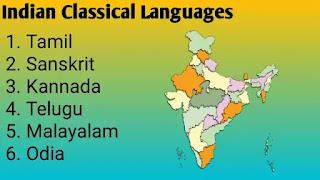


In a significant move towards preserving and promoting Indian languages, the Union Cabinet has approved the classical language status for five more languages - Marathi, Pali, Prakrit, Assamese, and Bengali. Union Minister Ashwini Vaishnaw announced the decision and highlighted the government's efforts to conserve and promote the classical languages. This decision has been welcomed by many, including Assam Chief Minister Himanta Biswa Sarma, who expressed gratitude to the Centre for including Assamese in the list. This move is aimed at honoring the historical significance of these languages and nurturing a deeper understanding among the younger generations.
Classical Language Status for Marathi, Bengali, Assamese, Pali, and Prakrit: A Milestone in Preserving Indian Heritage
Background:
India is home to a rich and diverse linguistic heritage, with over 121 languages recognized as part of the Eighth Schedule of the Indian Constitution. Among these, some languages have been designated as "Classical Languages" due to their historical significance and rich literary tradition.
Prior to the recent announcement, only six languages - Sanskrit, Tamil, Telugu, Kannada, Malayalam, and Odia - had been granted classical language status. The inclusion of Marathi, Bengali, Assamese, Pali, and Prakrit in this esteemed group is a testament to the government's commitment to preserving and promoting Indian linguistic diversity.
Significance of Classical Language Status:
Classical language status offers several benefits to languages, including:
Cabinet Approval for Classical Language Status:
On May 25, 2023, the Union Cabinet approved the conferment of classical language status to Marathi, Pali, Prakrit, Assamese, and Bengali. This decision was based on the recommendations of the Standing Committee of Parliament on Education, Women, Children, Youth, and Sports.
Union Minister Ashwini Vaishnaw welcomed the decision, highlighting its importance in promoting and preserving Indian linguistic heritage. He stated that the government was committed to supporting the development and promotion of all Indian languages.
FAQs:
Classical language status recognizes the historical significance, linguistic richness, and literary tradition of a language. It provides government support for preserving and promoting the language, including funding for research, teaching, and publication.
The languages selected for classical language status met the following criteria:
Benefits include government funding for research, teaching, and preservation efforts; increased recognition and appreciation of the language; and promotion of its use in education and cultural activities.
The recommendation to grant classical language status to these five languages was made by the Standing Committee of Parliament on Education, Women, Children, Youth, and Sports.
The government is committed to preserving and promoting all Indian languages. The conferment of classical language status is one step in this direction. However, it is important for all citizens to make an effort to learn, use, and appreciate their native languages and the diverse linguistic heritage of India.

The Kasibugga Venkateswara Temple in Srikakulam district was the site of a heart-wrenching stampede, causing multiple fatalities and affecting the community deeply. Chief Minister N. Chandrababu Naidu has expressed his sorrow over the unfortunate incident, as well as directing officials to ensure that those injured receive the best medical treatment possible. As local officials and public representatives are called to oversee relief operations, swift action is required to aid those affected and manage the situation effectively.

Indian Prime Minister Narendra Modi inaugurated the Shanti Shikhar Academy for Peaceful World in Raipur, praising the Brahma Kumaris organization for bridging India's ancient wisdom with the world's search for harmony. He credited the group's selfless service and spiritual discipline for their efforts towards universal peace. He positioned the Brahma Kumaris as protectors of India's soul and highlighted India's proactive role in addressing global crises such as disaster relief and environmental threats.

In an act of solidarity and protest, millions of Muslims in India used their Friday prayers to denounce the recent killings that took place in Pahalgam. The news comes amid growing tensions between the Muslim community and the Indian government. Many are viewing this as a sign of unity and determination from the Muslim population in India.

The state of Karnataka, or Kannada Rajyotsava, marked its 69th anniversary with a grand ceremony organized by the district administration in Mangaluru. District in-charge minister Dinesh Gundu Rao paid tribute to the leaders and writers who fought for a unified Kannada state and presented awards to 80 outstanding individuals and organizations. In his address, the minister highlighted the rich cultural and historical heritage of Karnataka and called for a sense of pride among its citizens.

Telangana's 'Run for Unity' event marked the 150th birth anniversary of Sardar Vallabhbhai Patel, India's first Deputy Prime Minister and architect of national integration. The event, carrying the message of "Ek Bharat - Shreshth Bharat", honored Patel's legacy of unity, sacrifice, and nation-building. Telangana BJP President N Ramachander Rao paid tribute to Patel and highlighted his pivotal role in integrating princely states, including Hyderabad, into the Indian Union. He also commended Prime Minister Narendra Modi and Home Minister Amit Shah for upholding Patel's ideals of national integrity.

The FBI has successfully stopped a potential terrorist attack in Michigan on Halloween weekend, according to FBI Director Kash Patel. Multiple suspects have been arrested after allegedly planning a violent attack that was connected to international terrorism. The suspects, whose ages range from 16 to 20, had engaged in firearms training and mentioned "pumpkin day" as a code for Halloween. White House Senior Director for Counterterrorism Seb Gorka confirmed the thwarted attack and stated that it was intended to occur during a time when children should be enjoying themselves.

Amidst criticism over his comments on his interfaith marriage to his Hindu wife, Usha, US Vice President JD Vance reiterates the importance of mutual respect, trust, and communication in their union. While he hopes she may someday embrace his Christian faith, her decision to maintain her beliefs is respected. Despite their differences, the couple has agreed to raise their children in the Christian faith, with Usha supporting them. At a Turning Point USA event, Vance also reaffirmed the couple's balanced approach towards managing their interfaith household.

Three days after TVK leader Vijay met with the family members of the victims of the Karur tragedy, Central Bureau of Investigation (CBI) team led by Superintendent of Police Praveen Kumar visited the rally site in Velusamypuram where the deadly stampede occurred. The officers conducted inquiries with locals and studied the topography of the area, as well as Vijay's travel route. The transfer of the case to the CBI and the re-registration of the FIR remains a secret and its contents have not been made public yet.

Prime Minister Narendra Modi praised the demonstrations by the indigenous dog squad as one of the most admired parts of the Rashtriya Ekta Diwas parade at the Statue of Unity. The squad included breeds like Rampur Hounds and Mudhol Hounds, with Mudhol Hound "Riya" leading the pack. PM Modi also applauded the Assam Police's Motorcycle Daredevil Show and the cultural performances at the parade, which reflected the theme of "Unity in Diversity." The event was attended by five Shaurya Chakra awardees and 16 gallantry medal winners from the CRPF and BSF.

The FBI has announced the arrest of multiple individuals in Michigan who were planning a violent attack over the Halloween weekend. Director Kash Patel praised the vigilance of law enforcement personnel and assured the public that there was no threat to the community. These arrests come after a previous arrest in May of a Michigan man who allegedly planned an attack on a US Army facility on behalf of the Islamic State group. The suspect remains in federal custody and is expected to plead guilty.